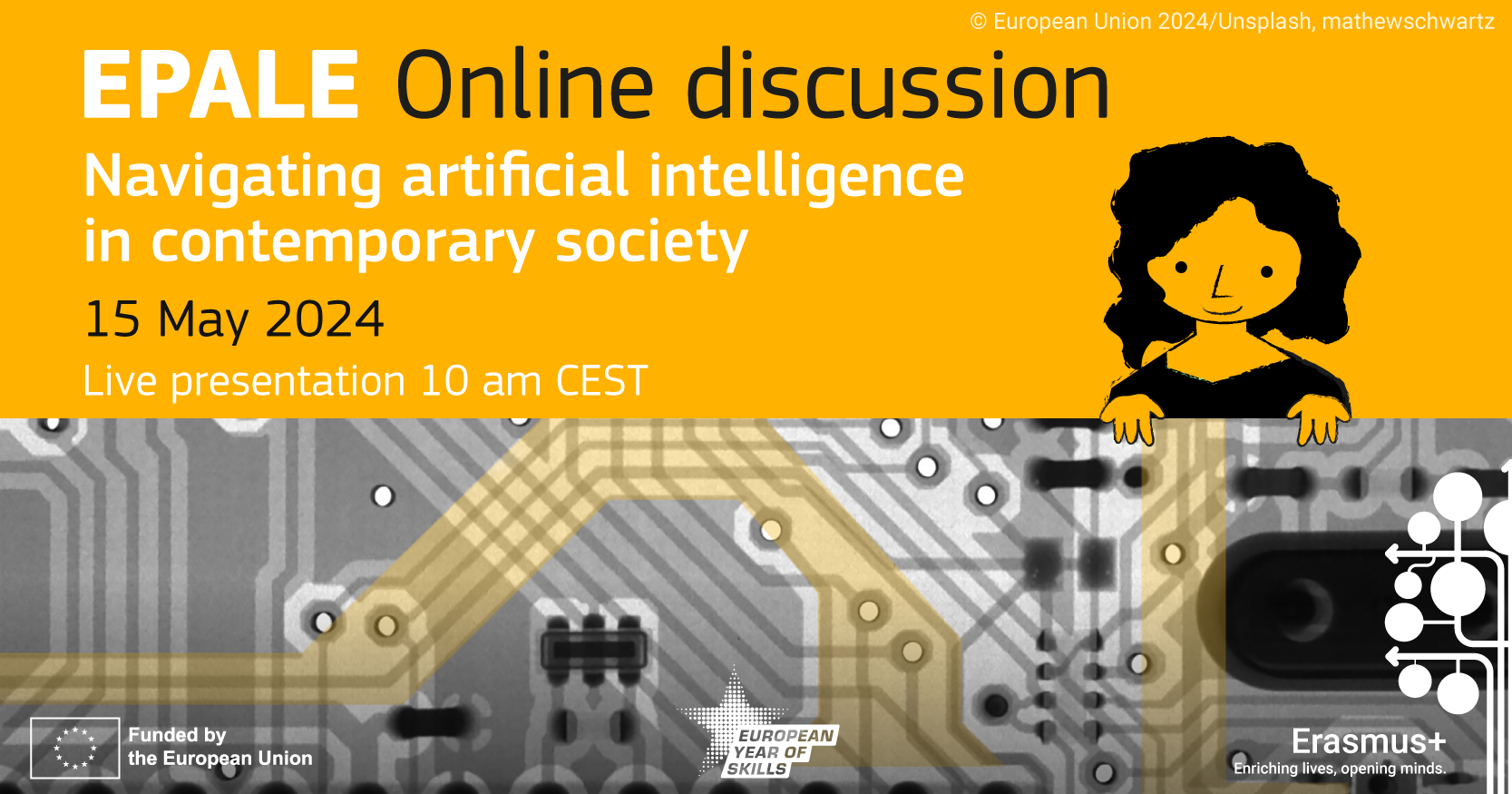Gjør deg klar for neste EPALE-debatt: "Navigating Artificial Intelligence in Contemporary Society"

Onsdag 15. mai 2024, klokken 10:00 CET, vil vi være vertskap for den den nettbaserte direktesendte debatten: "Navigating Artificial Intelligence in Contemporary Society".
Debatten begynner med en live-streaming med Steph Wright, leder av Scottish AI Alliance, og Christoph Bretgeld, en av gründerne bak SkillLab, i samtale med moderator Christin Cieslak fra EAEA.
Direktestrømmingen vil bli fulgt av en moderert skriftlig debatt, hvor medlemmer i EPALE kan delta. Ikke medlem i EPALE enda? Medlemskap er gratis, og du kan tegne medlemsskap her.
Konteksten
Gjennom denne dialogen vil vi fordype oss i virkningen av KI på enkeltpersoner og lokalsamfunn, med fokus på hvordan utviklingen av KI kan være i samsvar med våre ønsker og behov. Vi vil utforske betydningen av KI i samfunnet vårt, og diskutere samarbeidstilnærminger mellom nasjonale styresmakter i Europa, sivilsamfunnsorganisasjoner og internasjonale organer for å sikre ansvarlig utvikling av KI lokalt, nasjonalt og globalt.
Du kan forvente at noen av følgende spørsmål blir tatt opp under nettdebatten:
- Hvordan kan AI påvirke lokalsamfunn og mennesker positivt?
- Ettersom teknologien utvikler seg, hvordan kan vi holde KI-strategier fleksible?
- Hvordan kan vi sikre at KI-prosjekter er rettferdige for marginaliserte grupper?
- Hvordan kan myndigheter, sivilsamfunn og internasjonale organisasjoner samarbeide for å sikre ansvarlig bruk av KI i hele verden?
Debatten er internasjonal, og vil foregå på engelsk.

Kommentarer
Good morning! Thank you very…
Good morning!
Thank you very much for this online discussion focused on topics that should concern us all today.
I believe that Artificial Intelligence is still taking its first steps and that it will be, in the upcoming decades, a revolution in several dimensions of our lives. One of these dimensions will certainly be education and in particular adult education.
AI has the potential to integrate and help each of us understand how we can learn more or faster, but of course there is a danger of leaving out (or further behind) those who are not capable of using the devices to which AI will be linked.
In any case, it will be extraordinary to have the possibility to ask a machine to analyse the way each of us learns, based on our routines, and to present us with tools to learn according to who we are.
I think that, in the future, each of us will be able to learn better throughout our lives with IA, because there are not always formal or informal structures to provide the learning we need (at least, in Portugal). It is very likely that informal education will be the main form we will use to learn throughout our lives, after having completed our initial training.
In the future It will be possible to ask a device (just as we ask Alexa today to play us a song) to tell us how we can improve this or that skill and to help us along this path of improvement.
Furthermore, I hope that, in the future, AI will free me from tasks that I have to do today in order to have time to learn more and to explore new areas of knowledge.
In that sense, I think AI will allow us to have a better life but, in fact, this better life needs to be for everyone.
AI in contemporary society
Now, there is an intriguing topic for debate.
Personally, I am interested in ethics of AI, followed by "positive impacts" of this technology and concrete use for marginalized groups - are there any?
Discussion's page
Dear Ivan,
Many thanks for your interest!
Make sure to tune in to the discussion page later today!
Sara - EPALE Team





Ważne!
w tym kontekście warto zawsze zastanowić się, jak nie dać się oszukać sztucznej inteligencji? - analizując wyzwania związane z coraz bardziej zaawansowaną technologią AI, która zdobywa popularność. Jak w tym wszystkim ma się krytyczne rozumienie mediów? czy nasza rosnąca zależność od technologii nie prowadzi do spadku umiejętności krytycznego myślenia?